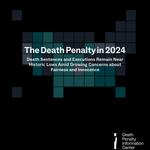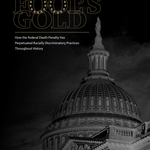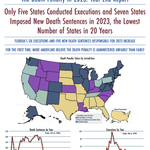DPI Reports
Below are reports released by the Death Penalty Information Center since its inception, covering subjects such as race, innocence, politicization, costs of the death penalty, and more. When opening a report, please allow the report page to load fully before selecting links to sections or footnotes. Most of these reports are also available in printed form from DPIC. For a copy of one of these reports, e‑mail DPI. For bulk orders, please download our Resource Order Form.
Reports are separated into Year End Reports, In-Depth Reports, and Special Reports. In-Depth Reports are DPI’s signature long, thorough reports on major death-penalty issues. These include “The 2% Death Penalty,” examining geographic arbitrariness in capital punishment, and “Behind the Curtain,” covering secrecy in the death penalty system. Special Reports are shorter, and typically address a specific event or question. These include DPI’s explanation of the 2017 spate of executions that were scheduled in Arkansas, and our analysis of the largest number of executions performed on a single day.
Featured
Reports
Dec 19, 2024
The Death Penalty in 2024

Death Sentences and Executions Remain Near Historic Lows Amid Growing Concerns about Fairness and Innocence. President Biden and North Carolina Governor Consider Commutations of Death Rows to Remedy Systemic Problems. Four States Responsible for 76% of Executions. The number of new death sentences in 2024 increased from 2023, with 26. The number of people on death row across the United States has continued to decline from a peak population in the year 2000. Public support…
Read MoreLatest
Nov 14, 2024
Fool’s Gold: How the Federal Death Penalty Has Perpetuated Racially Discriminatory Practices Throughout History
In 2020, President Joe Biden promised to end the federal death penalty during his administration and his Attorney General, Merrick Garland, acknowledged its many longstanding concerns as reasons to pause federal executions pending an internal review of Department of Justice policies and practices. Project 2025, the product of a political conservative movement, calls for President Trump to “obtain finality” for all federal death row prisoners. Before any decision about future use of the…
Read MoreJul 01, 2024
Lethal Election: How the U.S. Electoral Process Increases the Arbitrariness of the Death Penalty
Elected supreme court justices in Georgia, North Carolina, and Ohio are twice as likely to affirm death penalty cases during an election year than in any other year. This effect is statistically significant when controlling for the number of cases each year. Changing public opinion means that zealous support for the death penalty is no longer a litmus test for elected officials in many death penalty jurisdictions. Today’s elections feature viable candidates who criticize use…
Read MoreMay 14, 2024
Broken Promises: How a History of Racial Violence and Bias Shaped Ohio’s Death Penalty
In January 2024, Ohio lawmakers announced plans to expand the use of the death penalty to permit executions with nitrogen gas, as Alabama had just done a week earlier. But at the same time the Attorney General and the Ohio Prosecuting Attorneys Association are championing this legislation, a bipartisan group of state legislators has introduced a bill to abolish the death penalty based on“significant concerns on who is sentenced to death and how that sentence is…
Read MoreDec 01, 2023
Compromised Justice: How A Legacy of Racial Violence Informs Missouri’s Death Penalty Today
Missouri is one of a handful of states that has consistently executed people in the last five years. In 2023, Missouri executed four people. Understanding the historical application of the death penalty in Missouri helps our understanding of how capital punishment…
Read MoreDec 01, 2023
The Death Penalty in 2023: Year End Report
Only Five States Conducted Executions and Seven States Imposed New Death Sentences in 2023, the Lowest Number of States in 20 Years. Florida’s Six Executions and Five New Death Sentences Responsible for 2023 Increase. For the First Time, More Americans Believe the Death Penalty Is Administered Unfairly than…
Read More


